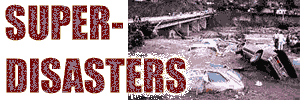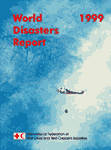 |
 |
 |
|
|||
|
Super-Disasters The Red Cross has just released its annual survey of world disasters and catastrophes. According to the "World Disasters Report 1999," last year's season of natural disasters was the worst on record -- and there's more to come. The report cites socio-economic conditions and -- "human-driven climate change" as two main reasons for the string of disasters. Has it come to the point where humans are wreaking so much havoc on the earth that the earth has decided to fight back? Drought, flooding, hurricanes, El Nino ... there's a lot of disaster potential out there. The "Disasters Report" warns us that we are about to experience a chain of "super-disasters." So I asked Paul Douglas, our Minneapolis meteorologist, what exactly distinguishes a "disaster" from a "super-disaster"?
Paul: "I don't know, I think you have to temper any report with a certain level of cynicism. There's still a consensus of meteorologists and global scientists that believe think the climate is in fact changing, warming up, becoming more severe with time. That trend, coupled with the increase in poverty, more and more people living along coastal regions, well, you have the potential for a major disaster. You're really playing Russian Roulette on a global scale here and it just seems like the numbers are coming up more often because of those two factors that are intertwined." Still, the concerned traveler shouldn't cancel any big trips. Paul says the keys are timing and careful planning.
Paul: "You have to know if you visit Caribbean or Mexico in Setp,Oct there is a fairly high likelihood that there may be a hurricane threat. If you go in March, April or May, you're fine."So, we're into the official hurricane season now - -it runs from June 1st to December 1st, peaking around Labor Day. Paul says this season promises to be pretty intense, thanks to La Nina. And if you are caught in a hurricane - you're safest in a well-built high-rise facility reinforced with concrete and steel.
Paul: "In a hurricane you want to get up - 2nd 3rd 4th floor or higher. The big concern in a hurricane is the storm surge, this dome of water that's pushed ashore up ahead of the eye of the storm Tides can rise 5, 10, 15, 20, 25 feet in a matter of minutes. And this is where people die, they drown. If you stay away from outer walls and windows ... I usually say "near the restrooms" is where I wuold be - near the center, near the elevataors - you're fine." But in the end, Paul says, there's no point in burying your head in the sand.
Paul: "I don't think there's any cause for panic -I have no intention of joining militia or heading up to hills or stockpiling water and weapons, um, it's cause for concern, and certainly this is consistent with the trend that we seem to be seeing in the data. There is al log ot gloom and dom -makes for great copy. It makes for a great televison report or a radio report." elevataors - you're fine."
|
 | American Public Media Home | Search | How to Listen ©2004 American Public Media | Terms of Use | Privacy Policy |

